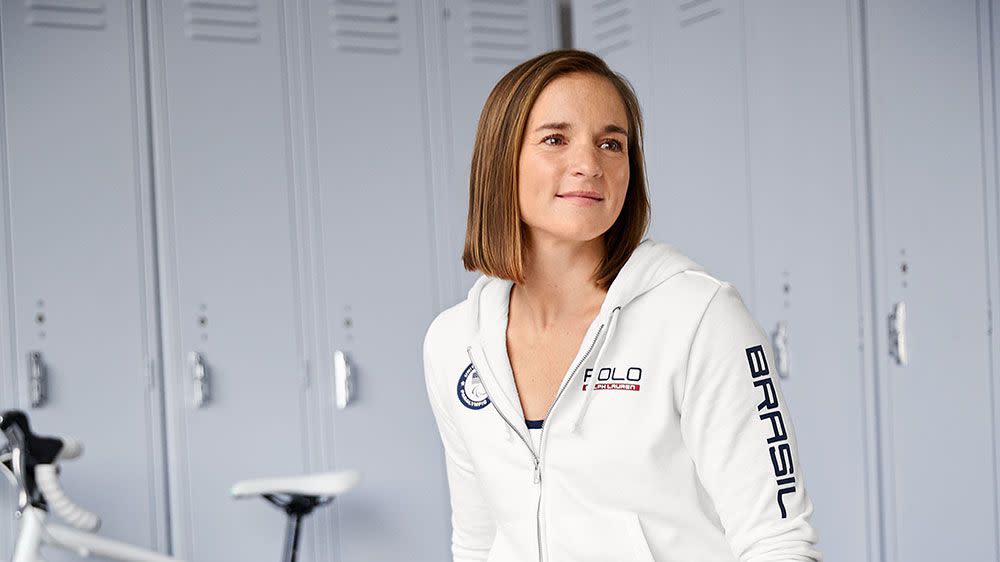Meet Melissa Stockwell, War Veteran Turned Paralympian

Ralph Lauren
When Melissa Stockwell, then 24, woke up in a Baghdad ER in 2004 with one leg (the other taken from her by a roadside bomb), the last thing on her mind was becoming a Paralympian. But that's exactly what happened. After medically retiring from the Army in 2005 with a Purple Heart, Stockwell began swimming for rehab, went on to join her first competitive team, and eventually, made the U.S. Paralympic Swim Team in 2008, making her the first Iraq War veteran to compete in the Paralympic Games. (She is also the first American woman to lose a limb in active combat.)
Since then, she's transitioned to the sport of paratriathlon (the Paralympic distance is a half-mile swim, 13-mile bike ride, and a 3.1 mile run), which will be debuting at this year's Paralympic Games in Rio. Along the way, she's become a three-time World Champion, co-founded the Dare2tri Paratriathlon Club to help other athletes with disabilities get into the sport, and still has a sense of humor about being an amputee. In other words, she's pretty much our hero. As part of her partnership with Jif, we chatted with Stockwell about her winding road to Rio.
Shape: After losing your leg, when did you realize that becoming a Paralympian was a possibility for you, and what made you want to pursue that?
Melissa Stockwell (MS): I did most of my rehab and learning to live with one leg at Walter Reed [Army Medical Center]. I was surrounded by a lot of other soldiers who were much worse off than I was-missing two, three, or four limbs, traumatic brain injuries, loss of eyesight. So I considered myself one of the lucky ones. I had to overcome the loss of my leg and everything that comes with that, but I decided I didn't want to let that define me. Gymnastics was my thing growing up-I had posters of the Magnificent 7 in my room and dreamed of being an Olympic gymnast. Obviously that never became a reality, but when I lost my leg it was like I had another chance. I learned about the Paralympics and as I sat in my hospital bed and thought about others who had come before me and done it, it made me think well, what if I could do that too? I wanted to turn my dreams into a reality and compete on the world's biggest stage with a Team USA uniform.
Shape: What made you take the leap from swimming to triathlons?
MS: I used to think triathletes were crazy-why would you want to swim, bike, and run all at the same time?! And, as someone who is missing one leg, how on Earth was I going to do that? But after Beijing, I got invited to do a triathlon in California. I figured alright, I'll give it a shot. I swam, and then I had running and biking-specific prosthetic legs. I was not fast, but being able to be on the same course as able-bodied athletes and cross that finish line got me hooked after one race. I fell in love with the sport and became very passionate about it. I was able to compete across the country and the world on the national team, and then three years ago, it was announced that paratriathlon would debut as a Paralympic sport this year in Rio, so that definitely became a dream of mine right away. 91 percent of Americans agree with me-being part of Team USA is really the honor of a lifetime, so to be able to do it twice was pretty remarkable.
Shape: Did you have experience running or biking before you lost your leg, or was this something that was new to you?
MS: I ran in the military because we had to, but I never considered myself a runner. And with a prosthetic, it's obviously much different than running with both of your legs, so I really had to re-learn both [running and biking]. I'm definitely much more fit now than I was in the military. I spend two to three hours per day training, and have to make sure get my sleep, my recovery, and my eating down to a science. It's a full-time job. On top of being a mom!
Shape: What was it like trying to 'bounce back' from having your son while also gearing up to compete at the highest level?
MS: It wasn't easy! It was extremely difficult to come back after my son. Any mom knows everything changes after you have a child, including your body. Coming back from that was one of the hardest things I've done. A lot of days I doubted myself and didn't know if I'd be able to do it, but the dream of being part of Team USA and having one of the best jobs I could ever imagine made it worth it. One time someone called out, 'You're a Supermom!' while I was running with my son in the stroller and it was so empowering! It was such a proud moment to reflect on how far I've come. (Next up, read why Stockwell and other Olympic athletes love their bodies.)
